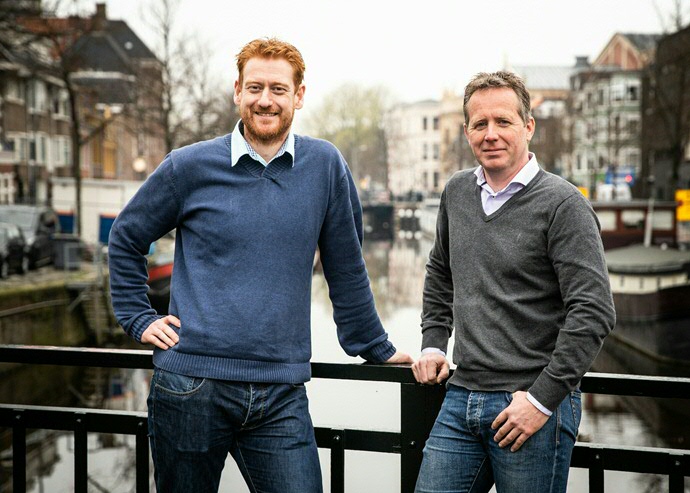BioMACS gaat voor revolutie in protheseland

BioMACS kan in drie dagen wat nu drie jaar duurt: het testen van de reactie van verschillende menselijke cellen op het materiaal van protheses. Die vinding kan verstrekkende gevolgen hebben. Minder infecties, minder afstotingsverschijnselen, minder problematisch littekenweefsel. Kortom: een betere samenwerking tussen prothese en lichaam.
Patrick van Rijn is er als onderzoeker bij het UMCG al jaren druk mee, samen met de studenten en promovendi die hij begeleidt. Monnikenwerk eigenlijk, dat veel zegt over de drive van de chemicus. ,,Ik ben geïnteresseerd in de wisselwerking tussen lichaam en prothesemateriaal. Hoe kan het dat het ene materiaal wordt afgestoten door het lichaam, terwijl het andere gastvrij ontvangen wordt?’’ ,,Ik weet dat elk materiaal en elke type cel invloed hebben op de succesratio. De ene cel houdt bijvoorbeeld van een prothese met een zacht oppervlak, de andere wil iets ruw en hard. Maar een goede manier om veel verschillende combinaties te testen, was er niet. En dat had ik voor mijn onderzoek wel nodig. Deze technologie ben ik dus eerst gaan ontwikkelen. Je zou me de maker van mijn eigen gereedschap kunnen noemen.’’
Heroperaties voorkomen
Simpel gezegd bedacht Van Rijn een systeem waarbij op één stukje siliconenrubber allerlei voor cellen verschillende eigenschappen worden aangebracht door een behandeling die doet denken aan regen onder een schuin afdak. En zo bleek hij in staat in één keer 10.000 experimenten te doen. ,,In een doorsnee laboratorium kost zo’n hoeveelheid een jaar of drie.’’ Het spreekt vanzelf dat de prothese-industrie het onderzoek met belangstelling volgt. Een producent van kunstlenzen bijvoorbeeld ziet een kans om heroperaties te voorkomen. Van Rijn: ,,Patiënten die vanwege staar een kunstlens krijgt, moeten na een tijdje terug naar de arts. Die lenzen worden door een reactie van het lichaam troebel en nastaar ontstaat. Dat alleen al kost in Nederland naar schatting 10 miljoen euro per jaar.’’
Patiënten helpen
En dan heb je nog borstprotheses, katheters, gewrichtprotheses, stents, slangetjes, eigenlijk al het materiaal dat in het menselijk lichaam wordt geplaatst. Een flink aandeel daarvan wordt door het lichaam amper geaccepteerd. Met als gevolg dat meer behandelingen nodig zijn om dat recht te zetten. BioMACS (de naam staat voor Biomaterial Advanced Cell Screening) kan daarin serieus wat betekenen. Van Rijn: ,, Mijn motivatie is dat ik via de wetenschap, patiënten hiermee geholpen kunnen worden. Zo simpel is het.’’ Dat lukt niet als het onderzoek in het lab blijft. De vinding, waarop octrooi ligt, moet dan ook de weg naar de markt vinden. Om die reden besloot Patrick van Rijn de samenwerking aan te gaan met Menno de Jong en Richard Hamstra. De Jong is nu CEO van de startup, Hamstra de man van de financiën en de zakelijke contacten.
Glorende toekomst
Menno de Jong, die meer startups hielp in hun weg omhoog, hoefde er niet lang over na te denken. ,,We hebben goed marktonderzoek gedaan en het is simpel: hier is vraag naar. Fabrikanten van protheses willen kwaliteit bieden. In de toekomst kunnen ze dankzij ons misschien wel gepersonaliseerde protheses maken. Dat is echt een soort droom voor ons ook. Dat we per lichaam een gepast advies voor het type prothese kunnen geven.’’ De eerste proefklant is al binnen. Intussen werkt Van Rijn gedreven verder aan de optimalisatie van zijn test. ,,Dat zit een beetje in mijn aard. Als ik me ergens in vastbijt, dan houd ik niet op voordat het perfect is.’’ De toekomst ziet er mooi uit, weet Menno de Jong. ,,We willen in een jaar of twee uitontwikkeld zijn en de markt te bestormen. Nu maken we nog gebruik van de faciliteiten van het UMCG, maar straks zie ik voor me dat we een eigen laboratorium hebben, waar veel mensen bezig zijn met onderzoeken. De technologie houden we voor onszelf. Wij kunnen heel snel tests uitvoeren voor de industrie en gepast advies geven. En daarmee de patiënt een beter leven bezorgen.’’
Tekst: Northern Knowlegde, Foto: Pepijn van den Broeke
Northern Knowledge is het consortium van Hanze, RUG en UMCG voor valorisatie en ondernemerschap.
